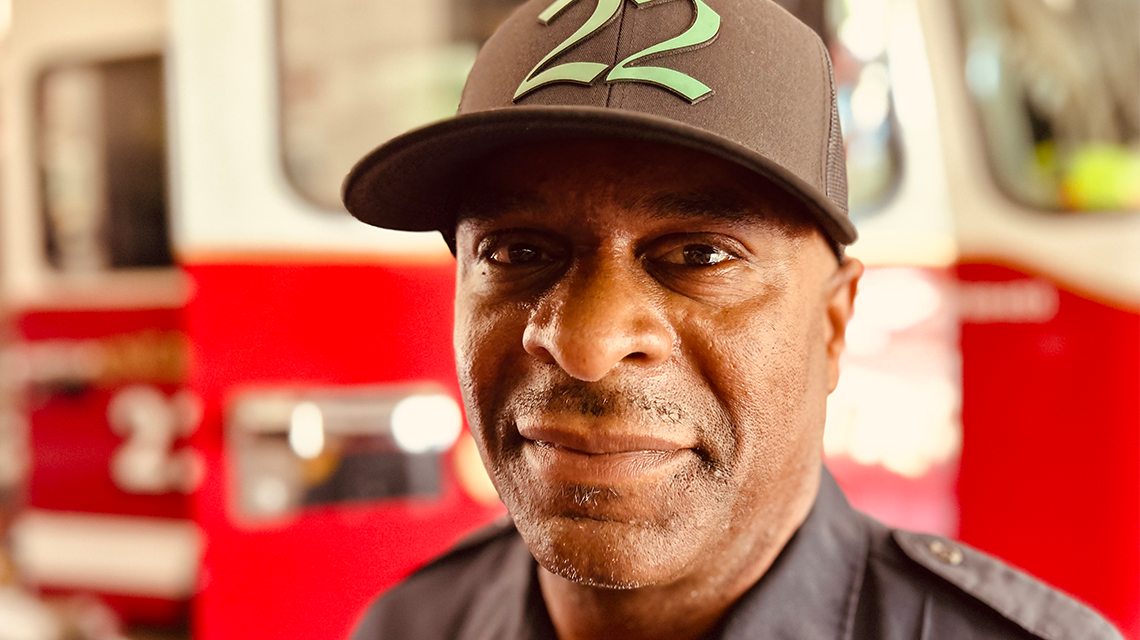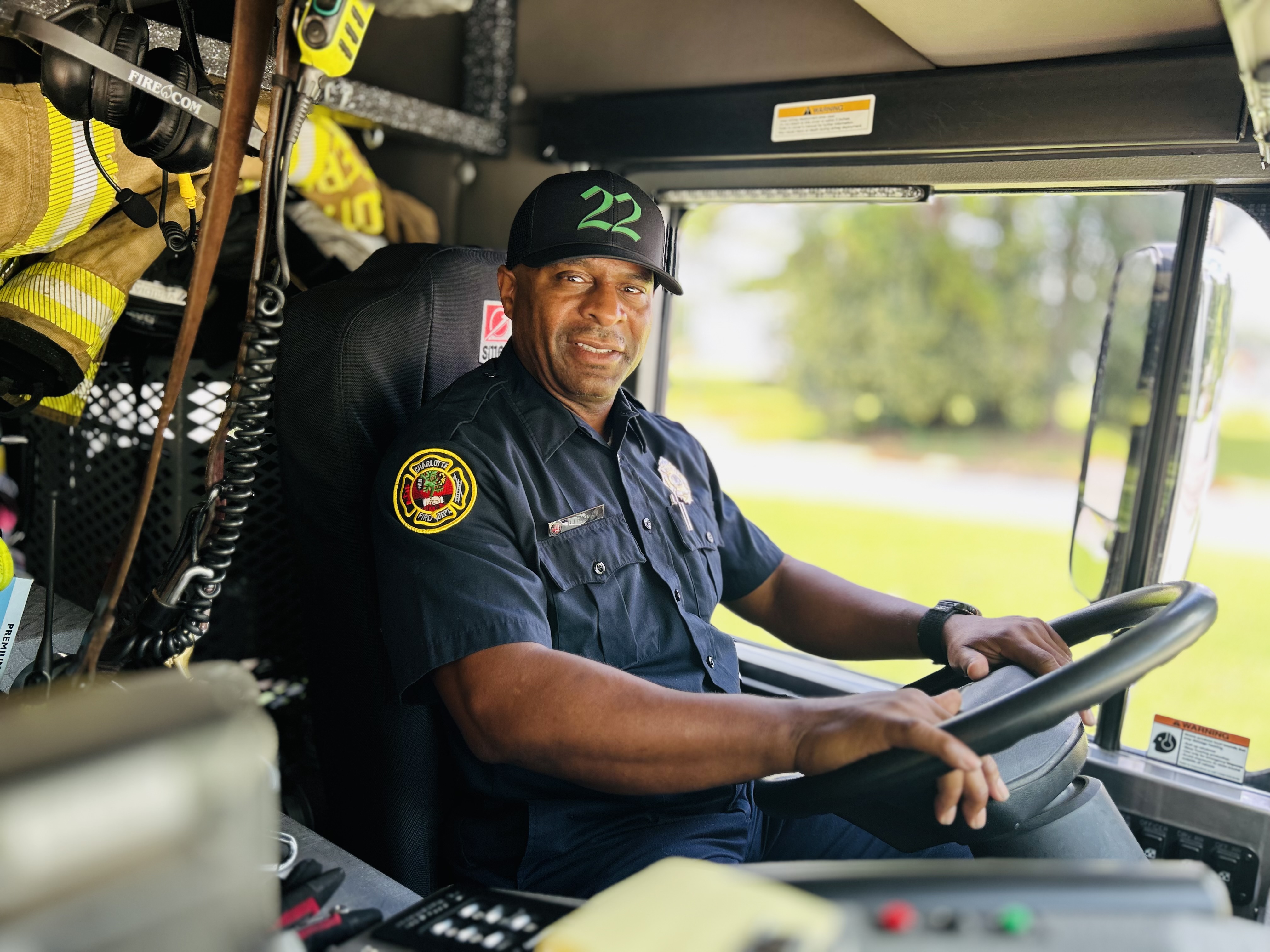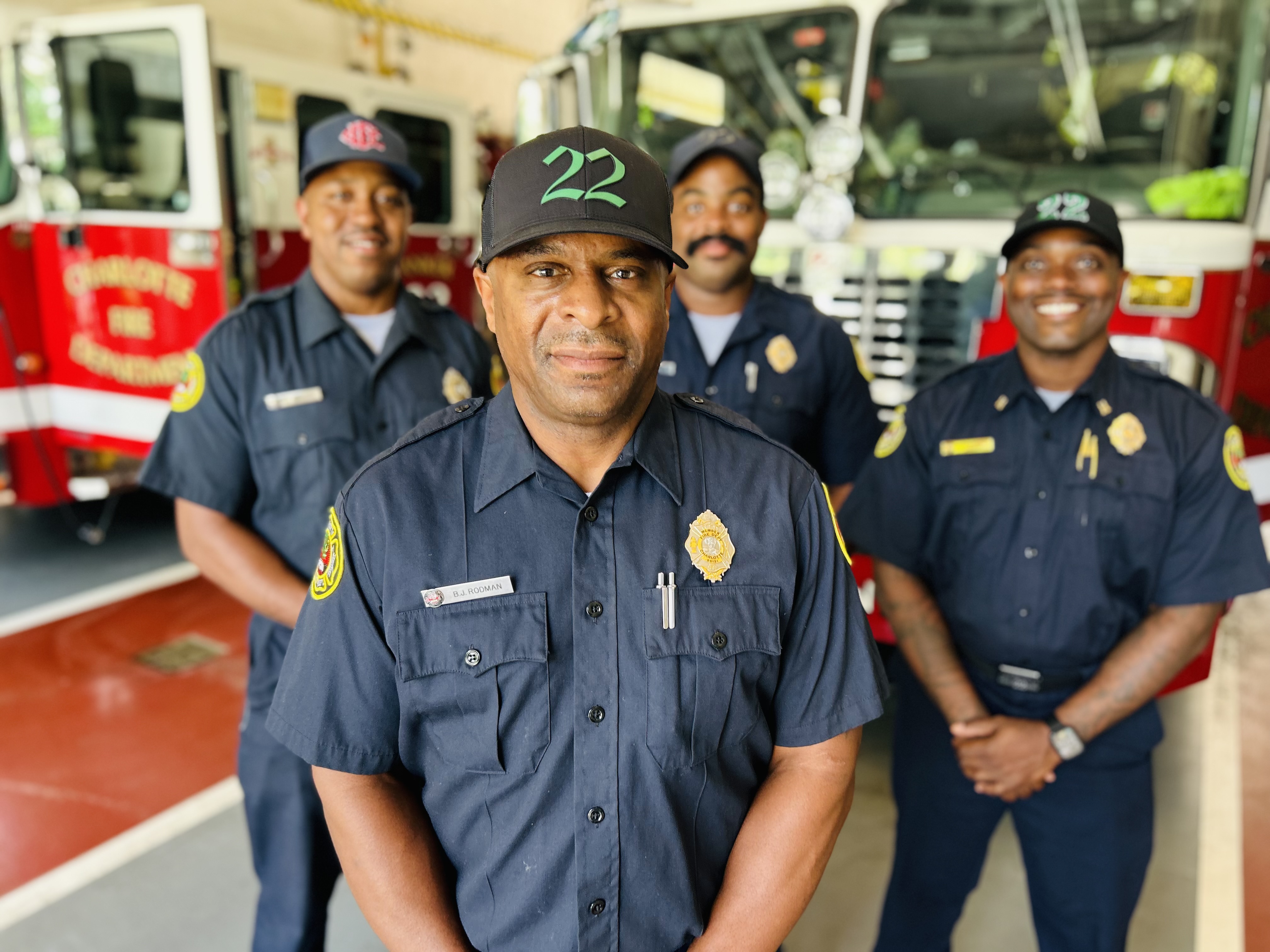Together on the Line: Firefighters Stand Through Cancer
Published on September 09, 2025

Brian Rodman stands in front of Engine 22, reflecting on his fight with prostate cancer and the support that carried him through the toughest moments of his life.
Facing the Fire Within
Engineer Brian Rodman has built his life around the fire service. He joined Charlotte Fire in 2006, rode the rigs at some of the city’s busiest stations, and became known as a steady presence on the back of a truck. But nothing in his two decades of firefighting prepared him for the phone call he took at Firehouse 1 in February 2022.
The voice on the other end was his urologist. The message was one no firefighter wants to hear.
“You have prostate cancer,” Rodman remembered the doctor saying. “Your whole prostate is ate up with cancer.”

Rodman behind the wheel of Engine 22, finding strength in staying connected to the work and the people who supported him.
The words knocked the wind out of him. At 50 years old, with no family history of the disease, it seemed impossible. The diagnosis came after his city-required physical, a routine checkup he never imagined would uncover something so life-altering.
“I was at Station 1, and I’ll never forget it,” Rodman said. “JT was there with me, and Captain Brown. They saw it on my face right away. They just grabbed me and said, ‘You’re not going through this by yourself.’ They called my wife. They called the chiefs. That’s when everything started.”
Rodman’s diagnosis escalated quickly. In just a month, his PSA levels had jumped from 4 to 8, then to 14. He was sent immediately to specialists, and more tests confirmed what he already feared.
Battalion Chief Jeff Richardson, who was overseeing Battalion 1 at the time, was on vacation when the call came. He rushed back.

Rodman in front of Engine 22, where returning to work became both a goal and a source of strength throughout his treatment.
“I was at Northern Tool when I got the call,” Richardson remembered. “One of the captains told me Rodman’s daughter had just said he had cancer. I got in my truck and drove straight to the firehouse.”
By the time Richardson arrived, Rodman’s wife, Kessha, was already there. The couple had just broken ground on a new house, and the weight of that responsibility, along with the uncertainty of cancer, added another layer of stress.
“I sat them down and said, ‘We’re going to come up with a plan. You’re going to be OK,’” Richardson said. “I tried to reassure them. I wanted them to know they weren’t alone.”
That reassurance became a theme in Rodman’s journey. From the first day, his firehouse family surrounded him. They made sure he could continue working while receiving treatment, giving him a sense of normalcy when everything else felt uncertain.

Rodman with his fire helmet, a symbol of identity and determination through his fight with prostate cancer.
Doctors confirmed Rodman’s cancer had advanced to Stage 4. His treatment plan included six months of radiation therapy and hormone injections. The radiation began in September 2022. Each morning, Rodman drove to Concord for treatment. The sessions lasted only 20 minutes, but the toll was heavier than the clock revealed.
“I scheduled them for 8 a.m. so I could get back to work,” Rodman said. “If I felt good enough, I’d come straight to the station. The guys embraced me. They wanted me there. That meant everything.”
The treatments came with side effects. The hormone therapy stripped his testosterone to nearly zero, starving the cancer but also altering his body. Hot flashes, mood swings, fatigue, weight gain, and a loss of drive wore him down.

Rodman in sharp focus as his Engine 22 crew stands behind him, a reminder of the support system that kept him steady during his battle with cancer.
“It made me feel like I wasn’t myself,” he said. “I gained weight, I was moody, I had hot flashes. And the hardest part, my drive was gone. That was tough for me mentally. There were days I came home and told my wife I couldn’t do it anymore. I was tired.”
On those days, his wife called his mother for backup. Together, they kept him moving forward. At the firehouse, Richardson and the crew provided the same steady support.
“He would come into the office at night,” Richardson recalled. “Sometimes he was emotional. Sometimes he just needed to sit. I didn’t always know what to say, but I knew I could be present. Rank didn’t matter. He’s my brother.”
Radiation treatments continued for months. Rodman kept working, determined to prove he was still part of the team. The firehouse backed him at every turn. When the day came to ring the bell, signaling the end of radiation, both companies from Firehouse 1 drove to Concord to be there.

Rodman alongside Engine 22, reflecting on how the firehouse family became as vital to his recovery as the treatments themselves.
“There are videos of it,” Richardson said. “They were there, hugging him, cheering him on. That’s what this job is about. That’s family.”
For Rodman, that moment crystallized the support that carried him through. “It wasn’t just me ringing that bell,” he said. “It was all of us.”
Rodman admits he is private by nature. At first, he told only a few people about his diagnosis. His wife wanted to keep the circle small until they knew more. But once the plan was in place, he opened up and saw the power in sharing.

Rodman’s helmet and turnout coat rest on the bumper of Engine 22, a symbol of both his service and the personal battles he continues to fight.
“Everybody says this department is a family, and they proved it,” he said. “It wasn’t just words. They carried me when I couldn’t carry myself.”
Chief Richardson said the experience deepened his bond with Rodman. “I outrank him, but when we sit down, there’s no rank. When my dad died, Rodman was there for me. That’s who he is. And during his fight, I just wanted to be that person for him.”
Rodman’s resilience impressed his fellow firefighters. Even while battling cancer, he was determined to keep doing the job. “He is as talented as anyone we have,” Richardson said. “He’s solid. When he goes to work, it shows.”

Rodman standing in the bay of Firehouse 22, where everyday marks progress in his fight against cancer.
Now stationed at Firehouse 22, Rodman continues to get tested every three months. His cancer is under control, though doctors monitor closely for changes. He says the experience taught him patience and the value of talking openly. “You have to find someone you can talk to,” Rodman said. “I tell guys now, don’t be stubborn. Do your physical. Get checked. That physical saved my life.”
He also speaks to the culture shift in the fire service. “Back when I started, dirty gear was a badge of honor,” he said. “Now we know better. Clean your gear. Take care of yourself. People already know you’re tough. You don’t need soot on your coat to prove it.”
The lessons stick with him every time he walks into the firehouse. “I still think about it,” Rodman said. “But I also think about the guys who showed up for me. That means more than I can ever say.”
Charlotte Fire Chief Reginald Johnson says Rodman’s story is a powerful reminder of what makes the fire service unique. “We fight fires together, but when cancer comes for one of us, we fight that together too,” Johnson said. “Brian’s resilience, and the support of his firehouse family, show the strength of this department.”

Engineer Brian Rodman with his current Engine 22 crew, representing the strength of today’s firehouse family and the ongoing support that defines Charlotte Fire.
For Rodman, the fight is not just about his health. It’s about making sure no firefighter feels alone. “I didn’t want people to know at first, but now I want them to,” he said. “Because the next guy who hears those words from a doctor needs to know he’s not by himself.”
His advice is simple: lean on your family, lean on your crew, and never skip a physical.
“The firehouse saved me as much as the doctors did,” Rodman said. “That’s the truth.”
Editor’s note: Facing the Fire Within is a four-part series sharing the personal stories of Charlotte Firefighters diagnosed with prostate cancer. The series aims to raise awareness, encourage early detection, and ensure no firefighter faces this battle alone.
Read more about what Charlotte Fire is doing to fight cancer in our department-wide overview: CHARLOTE FIRE'S PUSH TO BEAT CANCER